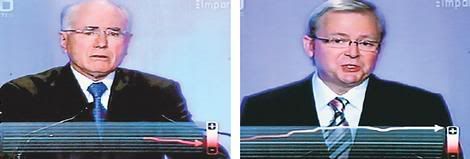“Game show format” may be the best way to describe the 2007 presidential primary debates. The networks seem determined to transform America’s political debate into entertainment and the parties and candidates seem to be playing right along.
With the writers’ strike underway, the networks may be seeking to transform American politics into the next reality television show. If so, then Americans may finally be given the “worm”.
In Australia, the “worm” has been a part of televised debates for more than a decade. Each audience member controls a dial to register a range of reaction to what is being presented from total disapproval to complete agreement. As the audience reacts, a squiggly line graph snakes across the screen displaying their positive or negative responses.
The “worm” was developed by the market research company Roy Morgan Research, which calls their tool “The Reactor”. The company claims that “unlike all other concept testing techniques, the Reactor provides the unvarnished opinions of respondents who provide immediate, instinctive feedback on how they feel about your product, concept or medium, element by element, second by second.”
Australia’s politicians have a love-hate relationship with the “worm”. A positive “worm” line will generate some favorable stories in the media for the candidate, while a negative “worm” can put a candidate on the defensive in the same way bad poll results can do. “I’m glad the worm doesn’t have a vote,”
Australian Prime Minister John Howard said after a 2004 debate that the “worm” showed that he done poorly. Howard and the Liberal Party went on to win the 2004 parliamentary elections as he did in 2001 and 1998 despite bad “worm” performances each time.
 |
| The “worm” in action during Australia’s Howard-Rudd debate in October. |
But this October, Howard and Kevin Rudd, the Labor Party leader, met for their only face-to-face debate in this year’s elections. Howard ‘demanded’ the “worm” not be used and Rudd wanted it to be used. When Australia’s Channel Nine began running the “worm” during the debate, the network’s debate feed was cut about halfway into the debate. Charges of government censorship of the press were made by Channel Nine. Howard, for his part, denied responsibility for the debate blackout. But the cowering of the other networks and the debate hosts may help explain what has kept the “worm” away from America’s televised debates.
In 1987, the trustees of the League of Women Voters voted unanimously to withdraw its sponsorship for America’s presidential debates, stating “because the demands of the two campaign organizations would perpetrate a fraud on the American voter. It has become clear to us that the candidates’ organizations aim to add debates to their list of campaign-trail charades devoid of substance, spontaneity and answers to tough questions. The League has no intention of becoming an accessory to the hoodwinking of the American public.”
Since then the presidential debates have noticeably declined as each party tries to control all aspects of the debate to its candidate’s advantage. The 2004 presidential debates, for example, were heavily negotiated.
This stylised piece of political theatre followed negotiations between Republican and Democrat campaign officials expressed in a 32-page agreement that covered details ranging from the choice of moderator to the height of and distance between the candidates’ lecterns. The candidates were precluded from asking questions of each other.
Are the parties losing control of the debates to the networks? The game show formats and ‘lightning rounds’ of the recent debates may be a sign of the media corporations gaining the upper hand. All the primaries run-up debates have been broadcast only on the hosting network. In the recent Republican debate, Fox ‘News’ demanded that Sen. John McCain cease and desist from using debate footage broadcast on its network, while allowing Gov. Mitt Romney’s campaign to use debate footage.
Since political debate has become a charade, maybe it is time to complete the transformation? The corporate networks could start to dictate the terms and more gimmicks may start appearing on TV during the debates.
 |
| Alex, I’ll take “Bloviation and Bombast” for 200. |
With a writers’ strike underway, the networks are expected to run more reality television shows. Much of our political debate has become little more than 30 second campaign commercials. Maybe the next step in transforming our politics into entertainment is reality television. Could audience and viewer participation voting formats such as “American Idol” work for American political debate? Would a presidential contender “Survival” show increase interest with American voters viewers?
Networks will never know if they don’t try it. Maybe even the debate “worm” might make its long-delayed appearance across America’s television screens.
Cross-posted on Daily Kos.

10 comments
Skip to comment form
Author
Any ideas on how to make our candidate debates more substantive?
debate be a good idea? Match ’em up 2 x 2 and
let ’em go for it. No moderator – just two at
a time head to head. Let them decide what issues to raise and ‘debate’. This crap we have now doesn’t allow them to say anything nor
does it allow us to learn anything.
As for the ‘worm’, I remember seeing it used somewhere on the tube (3? 7?) years ago.
You are exactly right. They are like game shows, with very little discussion, and lots of wasted air time.